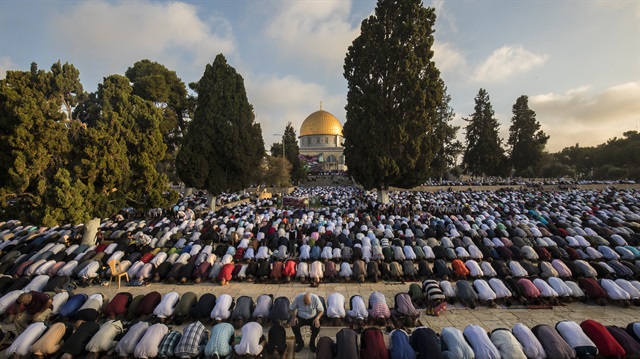
While Jewish settlers continue to enter Al-Aqsa in increasing numbers, they remain banned from praying there
Israel’s Supreme Court has asked the government of Prime Minister Benjamin Netanyahu to “justify” a longstanding ban on Jewish prayer inside East Jerusalem’s Al-Aqsa Mosque complex.
Israeli daily Maariv reported on Friday that the court -- Israel’s highest judicial authority -- had given the government 60 days to provide a reason why Jews were forbidden from praying at the flashpoint holy site.
The move reportedly comes in response to a petition lodged with the court by the Israeli Center for the Promotion of Democracy and Human Rights, an NGO that objects to what it describes as “government restrictions on non-Muslims” at the mosque complex.
“Israeli police… use their authority to apply explicitly discriminatory policies [against Jewish worshippers] that violate the freedom of worship,” the petition reads.
“The ban on non-Muslim visitors to the Temple Mount [i.e., the Al-Aqsa Mosque complex]… has remained in place for decades,” the NGO adds.
It remains unclear whether the court’s request will pave the way for a legal decision allowing Jews to pray at the mosque complex.
Since 2003, the Israeli authorities have allowed Jewish settlers to enter Al-Aqsa in increasing numbers while forbidding them from praying inside the site.
For Muslims, the Al-Aqsa represents the world's third holiest site after Mecca and Medina. Jews, for their part, refer to the area as the "Temple Mount", claiming it was the site of two Jewish temples in ancient times.
Israel occupied East Jerusalem -- in which the Al-Aqsa is located -- during the 1967 Arab-Israeli War, annexing the entire city 13 years later in a move never recognized by the international community.
In late 2000, a visit to Al-Aqsa by controversial Israeli politician Ariel Sharon sparked a years-long popular uprising against Israel’s decades-long occupation in which thousands of Palestinians lost their lives.




